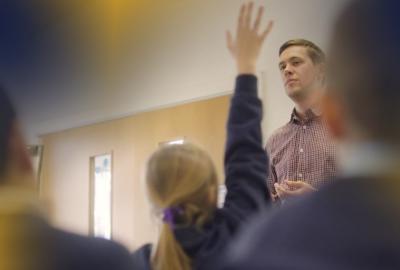If you're looking for your dream teaching assistant job, you're going to need to know how to write a personal statement. A teaching personal statement will form a vital part of your job application: it gives you a chance to describe your skills, experience and expertise as well as demonstrate how you meet the needs of the job you’re applying for.
A well-written, mistake-free personal statement could lead to you being invited to attend an interview or a school selection day, so it is vital you get it right from the start. It's important to:
- use plenty of examples from your recent teaching experience
- write clearly and succinctly, with no spelling or grammar errors!
- tailor your personal statement to the school and job you're applying for
- be honest and show off your passion for teaching
What is a teaching personal statement?
Your personal statement is used to explain why you want to become a teacher and your suitability for the role in question. While your application form briefly outlines your qualifications, skills and work experience, your teaching personal statement is your chance to stand out of the crowd and show off your personality.
What should be included?
Your personal statement should be tailored to the school or local authority to which you are applying and should be written with enthusiasm. It is your chance to describe your skills, experience, and why you have applied for the job in greater depth than you’re able to in your CV.
It’s also an opportunity to use evidence to back up your statement and show how you meet the requirements of the job you’re applying for. Give examples of your teaching experience, what year groups you have taught, any teaching methods you have used and how effective these have been.
Detail your beliefs and your vision for education in the future, your experience of working with class teachers, and your thoughts on any key policies relevant to the age range you will be teaching.
You can also include other related experience and interests such as extra-curricular activities or hobbies, which will give the school a chance to know more about you as a person, and your achievements and how those make you suitable for the role.
What shouldn’t be included?
No matter how hard we all try, we inevitably include information which probably doesn’t need to be in the personal statement. A prospective employer wants to know about your successes and achievements; what they don’t need is an intricate description of your interest in historical re-enactments. Try and stick to what is relevant.
You should also avoid clichés and try and write with some originality. You should also avoid simply stating that you’re the right person for the job and instead, provide evidence of why you are the right person.
Humour can be used to good effect but avoid controversial statements that could paint you in a bad light, and avoid great long lists of texts you have read. Instead, talk about how different texts, online resources, and studies have influenced your teaching style and back it up with examples of your previous teaching experience and any feedback you received.
Top tips:
- Check obsessively. Use a spell checker but read through several times looking for grammar and spelling mistakes
- Use your own tone of voice. Don’t try and pretend to be someone you’re not
- Make everything count – don’t waste space with long lists but rather explain how your past experiences will benefit the new role
- Avoid overused opening sentences
- Don’t use overly complex or convoluted language. Stick to a natural, professional tone, citing relevant examples and experience
Want any further advice on writing a personal statement? Click here to get in touch with our team of experts.



